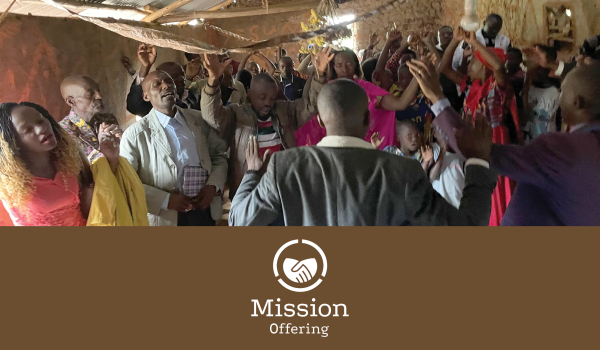
Worship resources for the 2022 Mission Offering
of the Church of the Brethren


Worship resources for the 2022 Mission Offering
of the Church of the Brethren
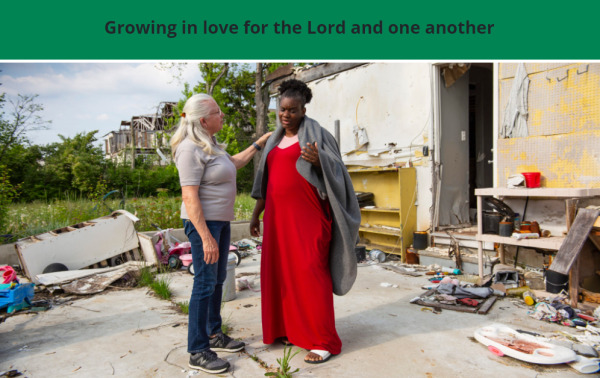
“As I have loved you, so you must love one another.
By this everyone will know that you are my disciples.”
– John 13:34-35, NIV
Dear family, friends, and faithful supporters of the Church of the Brethren:
It is with deep gratitude that I extend words of thanks to you for your contributions to support the Church of the Brethren. On behalf of those who will be blessed because of your generosity, thank you for growing in love for the Lord and others.
The 2022 Narrative Budget shows how your gifts do great things. It reveals how financial gifts entrusted to the Church of the Brethren are used for its faith-building and life-changing missions and ministries. It also highlights a broad view of 2021 ministry expenses and impacts, and current endeavors.
Thank you for partnering with us through your generous gifts and persistent prayers. We are so grateful for you as, together, we serve as the hands and feet of Jesus in our neighborhoods!
With gratitude,

Traci Rabenstein, director of Mission Advancement
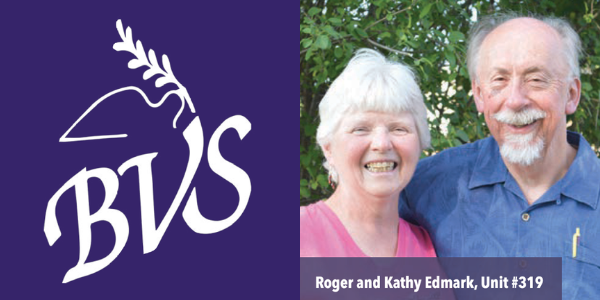
By Roger and Kathy Edmark, Brethren Volunteer Service Unit #319
Loving our neighbor usually involves people we run into everyday–the people next door, those in stores we frequent, those we encounter on the streets, our family, friends, and work associates. There are many opportunities to help people in their time of need, or maybe just with a smile. In our day-to-day lives these encounters make a difference and change the world around us. This is something we all can do each day.
But sometimes we get an unusual opportunity to meet new people in a place we have never lived before. An opportunity to help serve and love our neighbors in a little different way you may never have thought to do.
My wife and I did just that in August of 2019. We were sent by Brethren Volunteer Service (BVS) to Hiroshima, Japan to serve with World Friendship Center (WFC) as the volunteer directors. We were met by dedicated volunteers, English class students, and staff who all became our friends.
For seven months, before the pandemic closed the borders of Japan to tourists, we also received people from all over the world who wanted to study peace at WFC. World leaders of many countries consider atomic bombs to be “strategic” weapons of mass destruction. Hiroshima and Nagasaki survivors (hibakusha) know of the personal pain and devastation that atomic bombs indiscriminately wreaked havoc on everyone within the shadow of their destructive heat, hurricane force winds, and radiation. Barbara Reynolds, in 1965, established WFC as a place where people could come to hear the stories of the hibakusha and to work together for peace. The hibakusha’s cry is “No More Hiroshimas, No More Nagasakis!”
As you can imagine, this opportunity to live and serve in Hiroshima had a great impact on our lives. We are thankful that BVS works to connect people willing to serve “in a little different way.” BVSers serve with organizations all over the world needing volunteers, side-by-side with amazing people and groups making a difference.
You may have a heart to do something a little different too. If you decide to do something unusual or go someplace you have never been to, it may, like it did for us, change your life.
This article was originally featured in the summer issue of The Volunteer newsletter published by Brethren Volunteer Service. Learn more about this Core Ministry of the Church of the Brethren at www.brethren.org/bvs or support its ministry at www.brethren.org/givebvs.
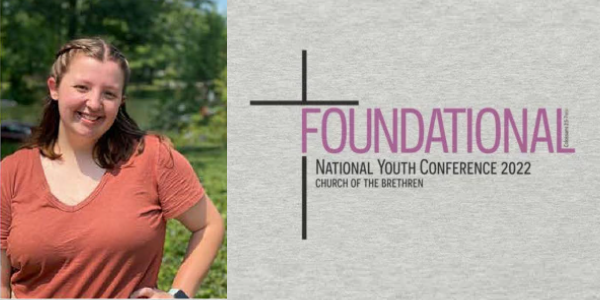
An interview by Jenna Walmer with Erika Clary, serving through Brethren Volunteer Service as the 2022 National Youth Conference coordinator with Youth and Young Adult Ministries
Tell me about your journey to becoming the National Youth Conference (NYC) coordinator. Were there any “God moments” where you knew this is what you wanted to do?
I attended NYC for the first time as a youth in 2014. Until that point, I went to National Junior High Conference and district events, but I never experienced anything quite like NYC. NYC 2014 was a mountaintop experience for me, both physically and spiritually. I remember thinking about how cool it would be to be an NYC coordinator and plan something that influential. I was a member of the 2017-2018 National Youth Cabinet, so I got to help plan NYC 2018.
There have only been a few times in my life when I feel like I truly thrived somewhere, and NYC 2018 was one of those times. It was so rewarding to pick the theme and watch it come to life in 2018. When I was a student at Bridgewater (Va.) College, I served on the inter-district Youth Cabinet, which plans Roundtable. In 2020, I served as the Roundtable coordinator. Roundtable is like a mini-NYC, and I loved coordinating that conference, so I knew I would love coordinating NYC just as much, if not more.
As much as I knew I wanted to apply to be NYC Coordinator for 2022, I still had some reservations—like living so far from home. That is where my major “God moment” comes into play, I have always loved the “for such a time as this” scripture from the book of Esther. In the fall of last year, someone sent me the theme song from NYC 2002, when the theme literally was “For Such a Time as This.” I really thought about the words in that scripture and in the theme song and realized that I could let my fears overcome me and not apply to be coordinator, because someone else could do it. But if I didn’t even try, I would never forgive myself for not applying for something I was (and still am) so passionate about. After that moment and realization, I began to realize that Esther 4:14 was following me everywhere. I would see it/hear it at the most random times and I just knew that was God’s nudge to me to apply. Thankfully, I took what I like to call my “Esther moment.”
What is your advice for people thinking about being a BVSer?
BVS has truly changed my life! It provides so many valuable life experiences. I barely knew how to cook anything before BVS, but since I live in a community house—and cook for myself and my housemates—I have learned how to make so many dishes. BVS, but specifically orientation, has made me realize so many things about myself and about my faith that could have taken me much longer to realize otherwise. This is the first time in my life when I’m not a student, so I am truly learning who I am outside of academics, which has been quite beautiful. If you are thinking about serving in BVS: do it. I could talk about my experience for days! It will change your life for the better.
Do you have any final words, advice, or wisdom to share about spiritual direction, following the call, or being in ministry or service?
I think my best advice is to do things in your own time. If you feel like the time is right to serve, whether through BVS or in ministry, try it! If you want to wait and try that later, then do that. I think we are conditioned to think that we must work on everyone else’s schedule and that we must know exactly what is going to happen next, but neither of those things is true. When you are called to do something, I think you will know the right time to take the leap of faith. When you are following God’s plans for your life, timing and perfection really don’t matter all that much. Following God’s plan is messy and doesn’t always feel perfect, but that’s okay. Do what you need to do for you and your relationship with God.
This interview is excerpted from the spring issue of Bridge produced by Youth and Young Adult Ministries. Learn more about National Youth Conference at www.brethren.org/nyc or support Youth and Young Adult Ministries today at www.brethren.org/giveyya.
A message from David Sollenberger, moderator of the 235th Annual Conference of the Church of the Brethren
As we anticipate meeting in person for the first time in three years for our Annual Conference, we recognize that we come from varied places, circumstances, and experiences. One common denominator, however, is a belief in the power that prayer affords us as we seek God’s leading and direction for this time together.
Pentecost Sunday, this year on June 5, is celebrated by many Christians as the “birthday” of the Church. We take time on that day and in the weeks that follow to remember the special gift of the Holy Spirit coming to those faithful apostles that were gathered, after the ascension of our Lord, in prayer and expectation.
It was the power of that Spirit that transformed a small, discouraged, and disorganized group of followers into a courageous movement of disciples that took the Gospel, in a few decades, to nearly all of the known world. More than 2,000 years later, we remember the exhilaration and might of that moment as part of our own “birth” story.
This is an invitation to pray through this season of Pentecost in preparation and expectation for the gathering of the Brethren in Omaha this summer, July 10-14. I ask that you join me in this opportunity to remember and pray for Annual Conference—in your family and in your congregation.
Pray that we might be open to, and guided by, the Spirit in our worship, our study, and our deliberations. Pray that we will be given the grace to treat each other as brothers and sisters in Christ in the best tradition of the Church of the Brethren. Pray for safe travels for those that give of their time and talent by serving the church at Annual Conference. Pray that each person who gathers in Omaha will experience a renewed anointing of the Spirit that will give energy and courage in abundance for moving Christ’s church into a confident future.
Thank you for considering these thoughts and this request. Thank you most graciously for all you do on behalf of our Lord and his Church.
Online registration for Annual Conference closes this Friday, June 10. Register today to participate in-person or online at www.brethren.org/ac.
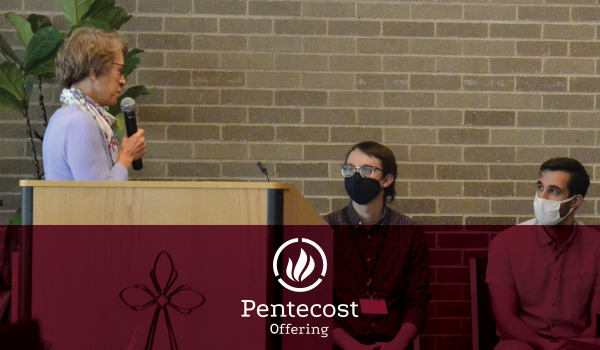
A sermon starter written by Nancy Sollenberger Heishman, director of the Office of Ministry, for the 2022 Pentecost Offering
“When the day of Pentecost had come, they were all together in one place.” ~Acts 2:1
When the day of Pentecost had come, the disciples, numbering 120, were all together in one place. All together? In one place? What might that have meant for them? What could it mean for us? From the gospel stories we know that being “all together” for the disciples in that place signified a community with no small number of differences. Within the original 12 disciples and those who had accompanied them in following Jesus, there were significant differences including culture, political leanings, conflicting personalities, economic and social status, proven loyalty, cowardice, and even betrayal regarding Jesus, and on and on. What must “all together” have meant to them? How comfortable was being “in one place” for disciples struggling with the trauma of Jesus’ public execution followed by his astounding resurrection?
How about for us in our congregations and communities as we are “all together in one place”? Are we relieved to finally be all together in one physical space even while still amid a seemingly unending pandemic? Does “in one place” include only physical space in church buildings or are we embracing our gathering place of worship as including virtual space? Are we increasingly finding ourselves out in new neighborhood spaces as we meet the challenge to embody Jesus’ presence in the neighborhood? What has changed in the last few years in our being “all together in one place”? What still needs to change in and among us as we gather so that we are more faithful to Jesus’ call?
Certainly, no effort is needed today to find differences in society and even the church that prompt alienation, segregation, and hostility, even a silent contempt of the other. Negative reactions to differences are often motivated by fear and can result in anger. Leaders can stoke those fears and fuel anger, but Pentecost Christians are called to reshape the current narrative based on an enthusiastic embrace of the story of the Holy Spirit’s powerful anointing.
The Pentecost story was certainly one of proximity, which is so essential to a faithful following of Jesus. At the recent graduation at Eastern Mennonite University (Harrisonburg, Va.), Bryan Stevenson, founder of the Equal Justice Initiative and author of the book, Just Mercy, began the commencement address with a call to graduates to live out their Christian faith through a very intentional proximity with the “least of these” who are in most need of Christ’s compassion and justice. Choose to be “all together in one place” with those you might not normally encounter, he suggested.
In a society where our lives are increasingly segregated in neighborhoods of homogeneity, the choice of intentional proximity to those in need of care puts us in the center of the Pentecost story where the Holy Spirit’s power transforms lives, creating God’s shalom. It does so as we learn to know our neighbors, sharing their joys and pains, hearing their dreams and longings, responding with the good news of Jesus.
Stevenson’s address was a fitting call to young leaders to embrace Pentecost’s power to prophetically do justice, love kindness, and walk humbly with God. It will require living in deliberate proximity with those whose differences may challenge an easy togetherness. Proclaiming a narrative of Christ’s embracing welcome can counter tropes of fearful anger. Persistently holding on to a divinely inspired mission, Pentecost-powered hope keeps the foundation of one’s shared place spiritually resilient. Saying a bold “yes” to Jesus’ inconvenient and often uncomfortable call to costly discipleship keeps Pentecost power alive and vibrant. All this speaks to what can happen when disciples of Jesus are deliberately and delightfully and surprisingly “all together … in one place.”
Find this sermon starter, offering announcements, and other worship resources for the Pentecost Offering of the Church of the Brethren (suggested date June 5) or give an offering today at www.brethren.org/give-offering.

Worship resources for the 2022 Pentecost Offering
of the Church of the Brethren
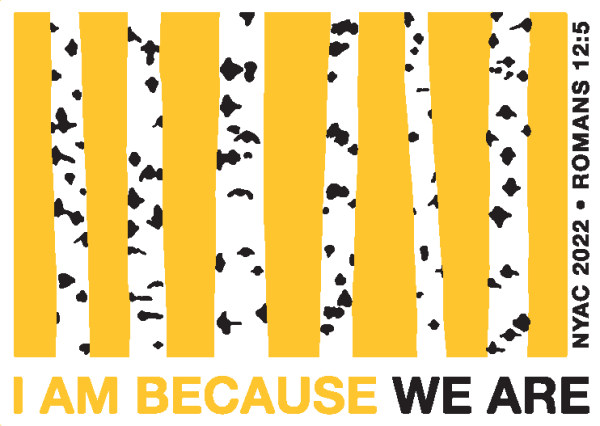
I am because we are
National Young Adult Conference focuses on the life-giving quality of community
By Becky Ullom Naugle, director of Youth and Young Adult Ministries
“So we, who are many, are one body in Christ, and individually we are members one of another.” ~Romans 12:5, NRSV
After so much pandemic living and the isolation it’s caused, the centrality of community in this scripture compelled the Young Adult Steering Committee (YASC) to choose Romans 12:5 as the theme for National Young Adult Conference (NYAC) 2022. Christians spend significant time focusing on the verses before and after this one–reminding ourselves that there are “many gifts but the same Spirit.” While the reality of variety in giftedness certainly deserves attention and study, it is occasionally challenging to recognize and identify God’s presence in another. However, as the world has learned so painfully over the last two years in our isolation, God built us to need each other.
Even if we chafe at standards and boundaries placed to enable peaceful and healthy living, humans have a deep and strong desire to be with others. We are undeniably affected by the relationships we create. Simply put, we are affected by our community. Often the implications of this reality are seen as a liability. However, NYAC participants will focus on the ways this reality is an asset. How are we as individuals enriched by being part of a community? How is life better when we are together, rather than apart? If we felt empathy for others due to such a deep connection through our baptism into the family of Jesus and the call to live as one of his disciples, what would our lives look like?
It is precisely such deep connection to a group that allows an aspen tree to live. From above ground, where we spend most of our time, we see distinct trees. If we are paying enough attention, however, we might note that aspen trees tend to grow in groups. But did you know that the “distinct” aspen trees are actually part of the same organism? They share a root system and resources (like water and nutrients).’ Aspens are a living expression of Romans 12:5: the “individual” thrives due to its deep connection to the larger body. After so much time away from the larger body, the Young Adult Steering Committee is eager for young adults to remember and strengthen connections with each other.
This article was originally featured in the spring issue of Bridge produced by Youth and Young Adult Ministries. Learn more or register for National Young Adult Conference at www.brethren.org/yac or support Youth and Young Adult Ministries today at www.brethren.org/giveyya.
(Read this issue of eBrethren.)
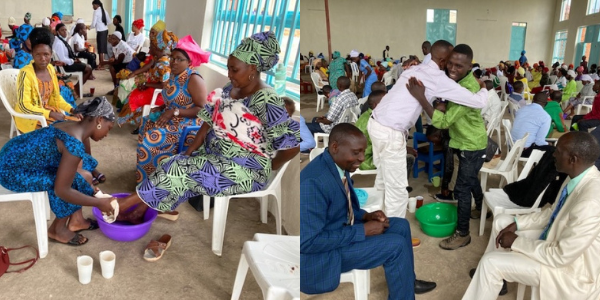
By Chris Elliott serving with the Church of the Brethren in Rwanda on behalf of the Office of Global Mission
Because the Church of the Brethren in central Africa is still young, the ordinances we are so familiar with in the US are new here. The Brethren in the Africa Great Lakes have neither a foundation of tradition nor any baggage of hang-ups, bringing advantages and disadvantages. For me personally, having participated and/or officiated in more than 100 love feasts, I can pretty much go through it on autopilot. If I’m not intentional, I can easily lose sight of the beauty and significance of the ceremony. Introducing our African sisters and brothers to it has been a great joy and has restored my own passion for it.
Marla Abe, Gary Benesh, Galen Hackman, and I have led groups through several teaching sessions since 2016. It is a relatively small number of us that have had both the privilege and the responsibility of this, which is a sort of scary thought. Fewer people than the fingers on one hand are laying the foundation for a lot of new Brethren. If nothing else I want to thank you all for your prayers and support–and for trusting us with such an important task.
My favorite story from those early teaching sessions comes from Congo in 2016. Gary, Marla, and I had a good teaching time of explaining the parts of the love feast service, along with the biblical basis for it all, including the holy kiss. Regarding the holy kiss, I shared that the old tradition was for a kiss on the lips, but depending on the cultural context, it could be a hug and/or a kiss on the cheek, at the very least a handshake. To finish out the session we wanted to have a brief demonstration. We put four chairs in the front and enlisted 3 volunteers. I washed the feet of the first, then he washed the feet of the next, and so on, while I went to sit in the fourth seat and take off my shoes. Pastor Aluta washed my feet and when we stood for the embrace, he smothered me with “holy kisses!” Definitely an event I will never forget!
Expert Bukene, lead pastor/bishop of the Church of the Brethren in Burundi, began instituting the feet washing and communion as he read about it in “A Dunker’s Guide to Brethren History.” For whatever reason, he didn’t pick up on the meal part of the service. When I met him for the first time last fall and explained the three-part love feast, he went back home determined to “do it right.” Five months later, Pastor Etienne and I went to Burundi to visit. The other pastors excitedly told us that they were looking forward to the upcoming love feast on Maundy Thursday. Their bishop had promised to buy a lamb!
The Brethren in Rwanda have had several love feasts since 2016, so the one we observed on Easter Sunday afternoon was not their first. The morning worship service was a resurrection celebration of nearly 5 hours. It was followed with the love feast meal of lamb, beans, potatoes, ugali, and rice. One of the pastors had butchered the lamb on Saturday.
As we moved toward the feet washing portion, I sensed that they were a little uncertain about procedure. Since this was the first time they had done it with a “muzungu” (a Swahili term for a Caucasian person) present, they watched me very closely as I demonstrated by washing and drying pastor Patrick’s feet, then hugged him and kissed him on the cheek. They seemed much more confident going forward from there. It truly was a beautiful time of fellowship and sharing.
The deacons prepared the bread and cup by first cutting white bread into half-size pieces and pouring Vital-O (a locally produced fruit flavored soft drink) into small communion cups. The elements were then passed to everyone. My preference at this point is for one of the local pastors to lead in the comments and prayer, as it can be awkward for me to share something solemn through a translator.
As I mentioned earlier, I’ve had a part in more than 100 love feasts–but this was my first one in Africa.
Learn more about the Church of the Brethren in Rwanda at www.brethren.org/global or support their ministry today at www.brethren.org/give-rwanda.
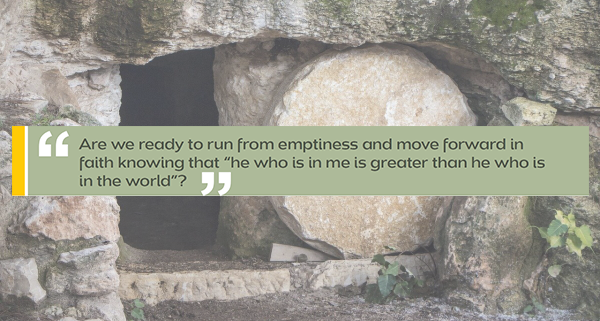
By Traci Rabenstein, director of Mission Advancement
Do you remember where you were on Aug. 23, 2011?
I do.
I was working for the Commonwealth of Pennsylvania in downtown Harrisburg. At first the day was no different than any other day, but around 2 p.m. things just didn’t seem right. I can’t fully explain the panic that came across me as I thought I was feeling the building move. At first I thought it was my imagination.
Suddenly I knew I didn’t want to be in the building, and I wasn’t alone. We headed for the stairwell and rushed out-side. By the time we congregated, we heard the news: There had been a 5.8-magnitude earthquake around Mineral, Va., just over 200 miles to the south.
Matthew 28 begins with a violent earthquake as the women were gathering at the tomb of Jesus to care for his body. What went through their minds? Where is he? Did someone take him? Maybe they felt sick to their stomachs, or light-headed. Maybe they were confused and afraid.
But the angel said, “Now hurry, go and tell his disciples, ‘He’s been raised from the dead. He’s going on ahead of you to Galilee. You will see him there’” (Matthew 28:7, CEB).
Matthew says that they ran—with “great fear and excitement”—to deliver the message to the eleven. He wasn’t there! There was an earthquake did you feel it? And this angel who rolled the stone away from the tomb told us to look for ourselves to see that Jesus wasn’t there.
Then Jesus himself “met them and greeted them. They came and grabbed his feet and worshipped him” (v. 9).
He said to tell the others he will meet them in Galilee. Off they went, full of joy as they exclaim to the disciples: He did it! He isn’t dead. And we saw him! Touched him! Held onto him for dear life. He told us to tell you he’ll meet you in Galilee. You can’t stay here hidden, you must go and meet him. He’ll be there!
Some of the disciples went to the tomb to see for them-selves, according to other Gospel accounts. They just couldn’t comprehend what the women were telling them. Why didn’t they believe them? Why didn’t they have faith?
Why don’t we? Do we continue to stare into an empty tomb?
What Jesus did in those three days was revolutionary! He conquered death. The fear of death is gone; the hope for eternal life is now what we wait for. “Do not be afraid!” the angel said. “Do not be afraid!” Christ said. Our relationship with a risen Savior gives us assurance that we no longer need to fear death. The mystery is still there; we have no way of truly understanding physical death until we go through it, but we do not need to fear it.
He took on our sins so that we would have a way to reconcile ourselves back to God without sacrifice. Without burnt offerings. Without priestly intercession. We have been given the Holy Spirit—God not only with us but in us.
That is worth running with excitement to share with others!
When I felt the tremors 10 years ago, I couldn’t get out of that building fast enough. When the women learned that Jesus was alive, they couldn’t get to the disciples fast enough.
Are we ready to stop being afraid? Afraid of congregations leaving? Of the dwindling size of the denomination here in the United States? Are we ready to run from emptiness and move forward in faith knowing that “he who is in me is greater than he who is in the world”?
Let us run with joy to tell our neighbors the good news of Jesus!
This reflection was originally featured in the April issue of Messenger magazine. Learn about the faith-building mission and ministries of the Church of the Brethren at www.brethren.org/greatthings or give an Easter offering to support them today at www.brethren.org/give.
(Read this issue of eBrethren.)